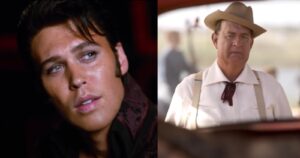Elvis
Posted on June 20, 2022 at 9:00 am
B +| Lowest Recommended Age: | Middle School |
| MPAA Rating: | Rated PG-13 for substance abuse, strong language, suggestive material and smoking |
| Date Released to Theaters: | June 24, 2022 |
| Date Released to DVD: | September 12, 2022 |

It begins with Colonel or rather “Colonel” Parker (Tom Hanks in a fat suit, with a weird accent and fake nose. “Citizen Kane” style, on what could be his deathbed, reminiscing about what he has loved and lost. As we hear his narration, we see him, in his hospital gown, wandering through a deserted Las Vegas casino, telling us about his connection to the young singer from Tupelo.
Elvis (played as a boy by Chaydon Jay) lives with his parents Vernon (Richard Roxburgh) and Gladys (Helen Thomson) in a Black neighborhood, where he is thrilled by the music around him, the sacred (gospel) and the profane (down and dirty blues). He is also immersed in country music, and somehow he (played as a teen and adult by a terrific Austin Butler) finds a way to synthesize all three into proto-rock and roll. Colonel Parker, a carny promoter, hears his music and realizes that he has the opportunity of the century, a white singer who sounds Black. Elvis is on the bill with a country star. He’s nervous at first on stage in his flamboyant pink suit, but then, like the revival meeting attendees struck by the spirit, he is, well, all shook up. And so is the audience. It’s almost like the Conrad Birdie “Sincere” scene in “Bye Bye Birdie.” Luhrmann brings a palpable, kinetic energy to the scene that is cheekily over the top.
The musical numbers (all but the very early ones with Elvis’ own voice) are dynamic, and an extended section where Colonel Parker sells the television network and the sponsor on an Elvis Christmas special featuring Elvis in a Christmas sweater singing carols and “Here Comes Santa Claus.” Elvis, still true to his muse, insists on wearing a black leather suit (now iconic, as is that entire 1968 special. The world changed around him but Elvis was never less than a thrilling performer, as we see at the end of film, with a short clip of his last performance, clearly ill and impaired, but nailing one of the most difficult songs of all, “Unchained Melody.”
The musical numbers: great. The romance with teenage Priscilla: not given much attention. The relationship with Colonel Parker: the central focus of the movie and the weakest part of the movie. We get no real insight into the internal lives of either characters; there’s an emptiness to the film when Elvis is not on stage. That could be the point of the movie, but it never acknowledges it. Tom Hanks never disappears into Colonel Parker. Compare him to Paul Giamatti in the similarly themed “Love and Mercy,” where the individuals and the manipulative, enticing, and abusive elements of the relationship were much more clearly defined.
I enjoyed the film. But then I came home and watched a half hour of clips of Elvis, and I enjoyed that a lot more.
.
Parents should know that this movie includes sex (non-explicit), drugs, and of course rock and roll, along with some bad behavior, relationship conflicts, and sad deaths.
Family discussion: Why was it so hard for Elvis to break off his relationship with Colonel Parker? How did Colonel Parker manipulate him? How is celebrity different today and how is it the same?
If you like this, try: Some of Elvis’ best movies like “Jailhouse Rock” and “Viva Las Vegas”
